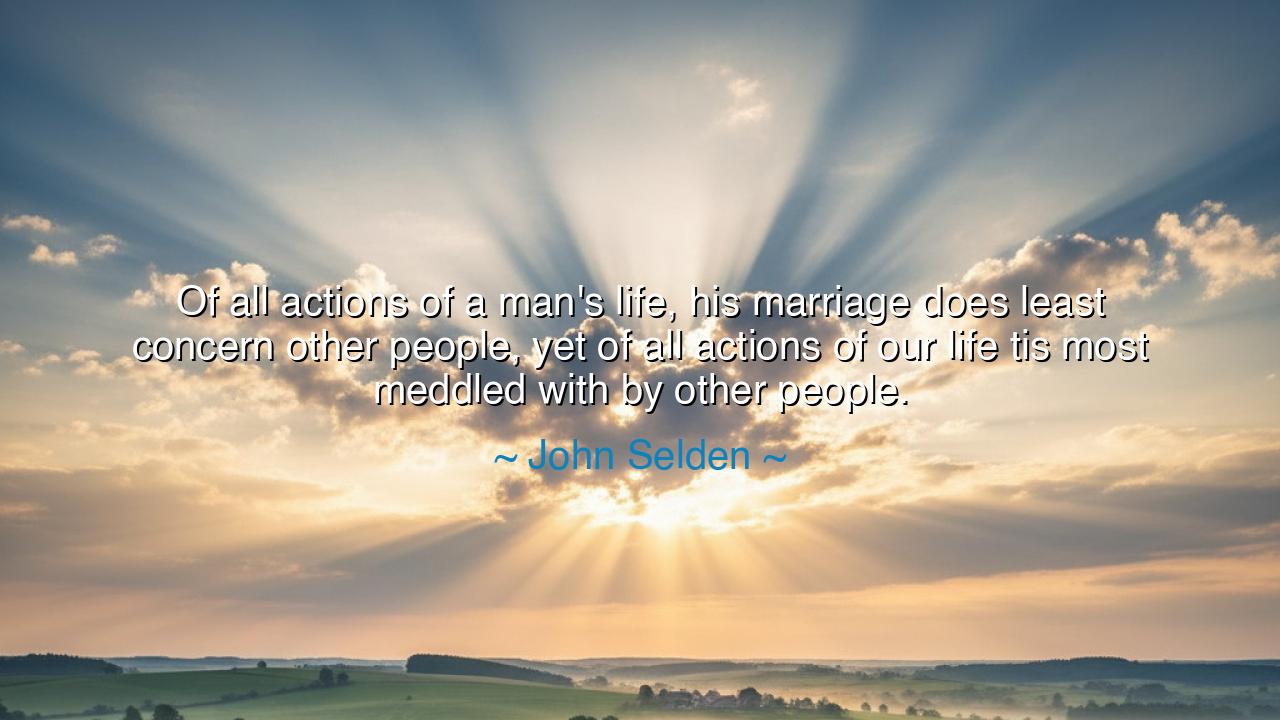
Of all actions of a man's life, his marriage does least concern
Of all actions of a man's life, his marriage does least concern other people, yet of all actions of our life tis most meddled with by other people.






O children of wisdom, gather closely and listen to the words of the great philosopher John Selden, for they carry within them a profound truth about the nature of marriage, society, and the delicate balance between personal freedom and public interference. "Of all actions of a man’s life, his marriage does least concern other people, yet of all actions of our life, ’tis most meddled with by other people." These words strike at the heart of the tension between the private and the public aspects of human existence. Marriage, though deeply personal, is a realm that others often seek to influence, to scrutinize, and to judge, despite its sacred nature as an intimate bond between two individuals.
In the ancient world, the idea of marriage was as old as time itself, and yet, its sanctity was frequently entangled with the expectations of society and the laws of the state. The Romans, for instance, viewed marriage not just as a union of love, but as a public duty—one that secured the stability of families and the continuity of the state. The paterfamilias, the head of the Roman family, had absolute control over the lives of his wife and children, yet the dynamics of the family, particularly marriage, were seen as something that reflected upon the society as a whole. Though a man’s marriage was at its core a private matter, it was also a public symbol of his virtue, status, and moral character. The Romans knew that a society’s strength rested not only on its political structure but on the moral fabric woven through its households.
Selden’s words reflect this ancient tension between privacy and public scrutiny. He acknowledges that marriage, at its essence, is a deeply personal action—one that concerns the individuals involved more than anyone else. Yet, despite its inherent privacy, it is often subject to the judgment and meddling of those around it. Society, it seems, feels entitled to voice its opinions on marriage, whether in the form of gossip, judgment, or cultural expectations. Marriage becomes something more than just the union of two hearts; it becomes a reflection of societal norms, ideals, and pressures.
Consider the example of King Henry VIII of England. His many marriages, often driven by the political and religious pressures of the time, became a matter of public spectacle and intervention. His marriage to Catherine of Aragon, and the subsequent split from the Catholic Church to marry Anne Boleyn, forever altered the course of English history. While his marriage might have been a deeply personal decision—one of love, power, and perhaps desire—it was made public by the tumultuous forces of religion, politics, and the expectations of the people. In this sense, Henry’s marriage was not merely a private affair, but a battleground for national identity and religious authority.
Selden’s insight into marriage as a realm of public interference rings true even today. From the very moment individuals announce their intention to marry, they are bombarded with opinions—from family members, friends, the media, and society at large. The expectations placed on a marriage can seem overwhelming, whether they concern romance, parenthood, or societal roles. Just as Henry VIII’s marriages were publicly scrutinized, today, marriage continues to be a source of meddling and judgment. We live in a world where individuals, despite their yearning for privacy, are expected to conform to a set of cultural norms about what marriage should look like, how it should function, and what it should achieve.
The lesson here is profound: marriage is at once the most private and the most public of unions. It is a choice made between two individuals, a bond that transcends the material world and touches the deepest parts of the heart. And yet, despite this intimacy, society often demands a share of it—whether through expectations, judgments, or cultural standards. Selden’s wisdom calls us to reflect on the ways in which we interfere with others’ private lives and how we might, in turn, resist the imposition of external pressures on our own relationships.
What, then, can we do in our own lives to honor this truth? We must first recognize that while marriage is deeply personal, it is also part of the larger society in which we live. We must strive to create a world where individual choices—whether in marriage or any other sphere—are respected and not subject to unnecessary scrutiny. Let us guard the privacy of others, offering our support, respect, and understanding, rather than judgment. In our own relationships, let us acknowledge that the bond we share with our partner is not for others to define, but for us to nurture and protect.
Let us walk forward, then, with the understanding that marriage is both a deeply private commitment and a matter of great public interest. May we find the strength to protect our relationships from the noise of societal expectations and stand firm in our own choices, understanding that the true value of marriage lies in the commitment of those who are involved—not in the opinions of others. And may we honor the sanctity of marriage, recognizing its power to shape our personal destinies and, ultimately, the destiny of the world itself.






AAdministratorAdministrator
Welcome, honored guests. Please leave a comment, we will respond soon